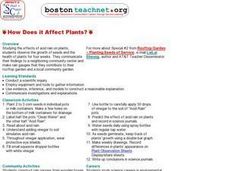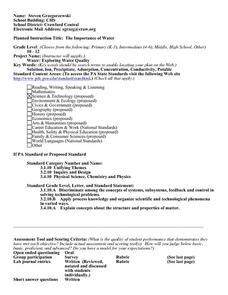Curated OER
Homology
Young scholars investigate the concept of homology. They are particularly interested in finding information about developmental homology. Students design a new animal correcting obvious mistakes on a worksheet provided by the teacher....
Curated OER
Creative Ways To Teach Evolutionary Concepts
Students explore evolutionary concepts in cartoons and lab activities. They describe and explain evolutionary concepts featured in a cartoon and participate in laboratory activities.
Curated OER
When Electronics Are No Longer Useful to Us: Disposing Responsibly
Learners discover ways to recycle electronics. Through discussion and research, they identify ways in which electronics that are improperly disposed can be harmful to the environment. Students explore how to responsibly dispose of...
Curated OER
Making Kites
Students engage in the study of kites and focus upon the evaluation and designs invovled. They conduct research into the different types of designs and use the information in order to create unique project designs. The drawings are...
Curated OER
Lightning It's Shocking, It's Frightening, It's Lightning!
Third graders decide what they want to explore lightning, how to go about finding the answers, and deciding what skills they need to further study some of their questions.
Curated OER
Introduction to Graphical Representation of Data Sets in Connection with Nuclear Decay
Students record data, make observations, and share in experimentation and discussion of numerical experiments.
Curated OER
Mammoth Sunflower Problem
Students discuss the directions on a package of seeds. They open the package, count the seeds, and determine the planting requirements for the seeds.
Curated OER
Creating Communities
Students design a community with minimal environmental impact. They rate each other's community's presentation using the "Planning and Zoning Commission Rating Scale".
Curated OER
Flying the Friendly Skies
Young scholars investigate aerodynamics by comparing and contrasting the flight of two gliders. They make prediction and observation charts and test a variety of hypotheses using paper gliders.
Curated OER
Living With Fire
Students identify effects of treatment weather on behavior of a wildland fire. They view simulation game that predicts effects of forest management on fire behavior.
Curated OER
How Does it Affect Plants?
Students examine the effects of acid rain on plants. They observe the growth of seeds and the health of different plants for a month. They share their findings with the community.
Curated OER
Charting Our Waters
Students create an attribute chart to organize their learning about water. They work with a partner to incorporate academic vocabulary to complete their chart. Students may volunteer to share their charts with the entire class.
Curated OER
The Importance of Water
Students explore the importance of water. They discuss why water is important and students design an experiment that evaluates the water quality and methods of improving water quality. Students perform testing and report their findings.
Curated OER
Something's Fishy
Fourth graders identify parts of a fish. In this fish anatomy lesson, 4th graders identify parts of fish in a group setting and then complete a worksheet about the parts of a fish.
Curated OER
People of the Cassini Team
Students discuss the job qualifications of a team member for a space mission. In this space science lesson, students select a mentor from the Cassini team members and explain the reason for their selection. They assess the importance of...
















